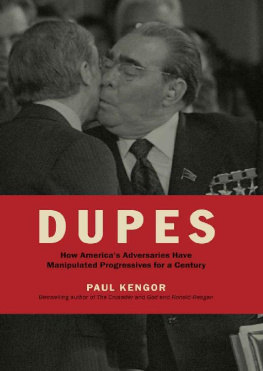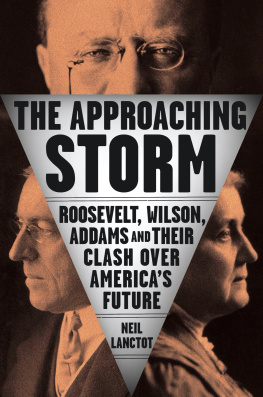Paul Kengor - Dupes: How Americas Adversaries Have Manipulated Progressives for a Century
Here you can read online Paul Kengor - Dupes: How Americas Adversaries Have Manipulated Progressives for a Century full text of the book (entire story) in english for free. Download pdf and epub, get meaning, cover and reviews about this ebook. year: 2014, publisher: Intercollegiate Studies Institute, genre: Politics. Description of the work, (preface) as well as reviews are available. Best literature library LitArk.com created for fans of good reading and offers a wide selection of genres:
Romance novel
Science fiction
Adventure
Detective
Science
History
Home and family
Prose
Art
Politics
Computer
Non-fiction
Religion
Business
Children
Humor
Choose a favorite category and find really read worthwhile books. Enjoy immersion in the world of imagination, feel the emotions of the characters or learn something new for yourself, make an fascinating discovery.
- Book:Dupes: How Americas Adversaries Have Manipulated Progressives for a Century
- Author:
- Publisher:Intercollegiate Studies Institute
- Genre:
- Year:2014
- Rating:5 / 5
- Favourites:Add to favourites
- Your mark:
- 100
- 1
- 2
- 3
- 4
- 5
Dupes: How Americas Adversaries Have Manipulated Progressives for a Century: summary, description and annotation
We offer to read an annotation, description, summary or preface (depends on what the author of the book "Dupes: How Americas Adversaries Have Manipulated Progressives for a Century" wrote himself). If you haven't found the necessary information about the book — write in the comments, we will try to find it.
Dupes: How Americas Adversaries Have Manipulated Progressives for a Century — read online for free the complete book (whole text) full work
Below is the text of the book, divided by pages. System saving the place of the last page read, allows you to conveniently read the book "Dupes: How Americas Adversaries Have Manipulated Progressives for a Century" online for free, without having to search again every time where you left off. Put a bookmark, and you can go to the page where you finished reading at any time.
Font size:
Interval:
Bookmark:
How America's Adversaries Have Manipulated Progressives for a Century
PAUL KENGOR, PH.D.

W ILMINGTON , D ELAWARE
While Communists make full use of liberals and their solicitudes, and sometimes flatter them to their faces, in private they treat them with that sneering contempt that the strong and predatory almost invariably feel for victims who volunteer to help in their own victimization.
Whittaker Chambers, Witness
For the time will come when people will stop listening to the truth and will be diverted to myths.
2 Timothy 4: 34
Dedicated to two human Cold War archives:
Herb Romerstein,
who chose the right side,
and
Arnold Beichman (19132010),
the cheerful Cold Warrior
T his is a book about dupes, about those Americans who have unwittingly aided some of the worst opponents of the United States. Misled about the true aims of foreign adversaries, many Americans (and other Westerners) have allowed themselves to be manipulated to serve opponents interests. Most notably, after the Bolshevik Revolution and throughout the Cold War, Communists took full advantage of Western dupes. Indeed, Communist propagandists in the Soviet Union, around the world, and within America itself conducted this duping on a remarkable, deliberate scale and with remarkable, deliberate craftsmanshipwith America's liberals and progressives as the prime target. Yet the story does not stop with the end of the Cold War. Unfortunately, dupes have surfaced in the War on Terrorincluding some of the very same Americans who unknowingly played the role of sucker to the Sovietsoccasionally providing fodder for Middle East enemies, although the periods, and the processes, are quite different.
Pointing out this ongoing phenomenon is not a matter of beating up on the gullible. Using the word dupes may come across as name calling or sensationalism, but the reality is that it is the best term to describe those who are deceived by, and therefore unknowingly assist, foreign adversaries. The word has, in fact, been widely used throughout American history and up to the present to characterize the tools of foreign influence. President George Washington used the term dupes in his historic 1796 Farewell Address, for example. said they regretted having been duped; others spoke openly of fears of being duped.
The plain, undeniablebut historically unappreciatedfact is that the dupe has played a significant role in the recent history of America and in the nation's ability to deal with destructive opponents. This book aims to shine light on this troubling aspect of our history. Of course, the phenomenon of the dupe is not merely of historical interest. Because it persists today, we must understand how the duping occursboth how our opponents exploit the American home front and how some Americans allow themselves to be manipulated.
When I began this project, I did not recognize the extent to which duping still occurs, or how duping in the distant Cold War past has emerged as very relevant in today's politics. I initially conceived of the book as strictly a Cold War project. But it was nothing short of stunning to research this book during the presidential bid of Barack Obama and hear so many of the names in my research surface repeatedly in the background of the man who became president of the United States of America. The names included the likes of Frank Marshall Davis, a mentor to the young Obama in Hawaii; the controversial, well-publicized Bill Ayers; and the marquee figures in the 2008 group Progressives for Obama, which read like a Who's Who of the 60s radicals called to testify before the House Committee on Internal Security. It was impossible for me to have foreseen this, given that I decided to pursue this project in 2006, when no one on the planet would have predicted the 2008 presidential election of a young politician named Barack Obama. Though I had not expected to extend the narrative beyond the Cold War, I concluded that this information could not be ignored. It would be a worse sign of bias to ignore it than include it.
Nor is Obama is the only such contemporary case. Other political leaders today are products of the Vietnam era or the political godchildren of notable Marxist radicals, and they seek to lead America in a new war against a new kind of foreign totalitarianism. Here, too, the Cold War past is not entirely disconnected from current threats. In key ways, past is prologue.
Lenin's Deaf-Mutes
It would be easy to dismiss dupes as gullible but ultimately harmless. But in fact, they have proven indispensable to America's adversaries. Most significantly, dupes were front and centereven when unaware of their positionin the longest-running ideological battle of the twentieth century, which began in October 1917 and did not end until the period of 198991, and which saw the deaths of an unprecedented volume of human beings at the bloody hands of Communism.
The pervasiveness of the dupe, and of Communist efforts to manipulate Americans, has become fully apparent only with the massive declassification of once-closed Cold War archives, from Moscow to Eastern Europe to the United Statesthe central factor that made this book possible and demanded it be done in the first place. These voluminous archives, especially those of the Soviet Communist International (Comintern) on the Communist Party USA, are the primary source for this book, and were its heart and motivation.
From these records we now know that American Communists and their masters in Moscow (and masters is not too strong a word, as this book will show) were acutely aware that they could never gain the popular support they needed to advance their goals. Instead they concealed their intentions and found clever ways to enlist the support of a much wider coalition that could help them push their private agenda. The Communists carefully ensured that the coalition was kept unaware of that agenda. The larger coalition was dupedor at least targeted to be duped.
The Communists could not succeed without the dupes. If they flew solo, operating without dupes at their rallies, at their protests, in their petitions and ads in newspapers, then the Communists would reveal themselves to be a tiny minority. They also would be open to immediate exposure.
The dupes lent a presence, an apparent legitimacy, credibility, and generally a helping hand to the pro-Moscow agenda. Without the dupes, the Communists were dead in the water. Thus, they sought out the dupes desperately.
From the outset of the Bolshevik Revolution, the Soviet Union specialized in this unique form of outreach. Vladimir Lenin himself preached the mode of recruitment: The so-called cultural element of Western Europe and America, averred Lenin, speaking of the elite, are incapable of comprehending the present state of affairs and the actual balance of forces; these elements must be regarded as deaf-mutes [idiots] and treated accordingly. These so-called useful idiotsthe title of a bestselling book on the Cold War by Mona Charenwere to be major components of the Communists campaigns.
The Communists targeted nave individualsusually on the left, and nearly always liberals/progressives liberals were prey, typically made vulnerable by their misplaced trust in the far left. They mistakenly saw American Communists as their friends and as simply another group of citizens practicing civil liberties in a democratic society based on First Amendment freedoms. Most liberals, obviously, were not themselves Communists, but in sharing the left portion of the ideological spectrum, they shared with the Communists many key sympathies: workers rights, the redistribution of wealth, an expansive federal government, a favoring of the public sector over the private sector, class-based rhetoric (often demagoguery) toward the wealthy, progressively high tax rates, and a cynicism toward business and capitalism, to name a few. The differences were typically matters of degree rather than principle.
Font size:
Interval:
Bookmark:
Similar books «Dupes: How Americas Adversaries Have Manipulated Progressives for a Century»
Look at similar books to Dupes: How Americas Adversaries Have Manipulated Progressives for a Century. We have selected literature similar in name and meaning in the hope of providing readers with more options to find new, interesting, not yet read works.
Discussion, reviews of the book Dupes: How Americas Adversaries Have Manipulated Progressives for a Century and just readers' own opinions. Leave your comments, write what you think about the work, its meaning or the main characters. Specify what exactly you liked and what you didn't like, and why you think so.









